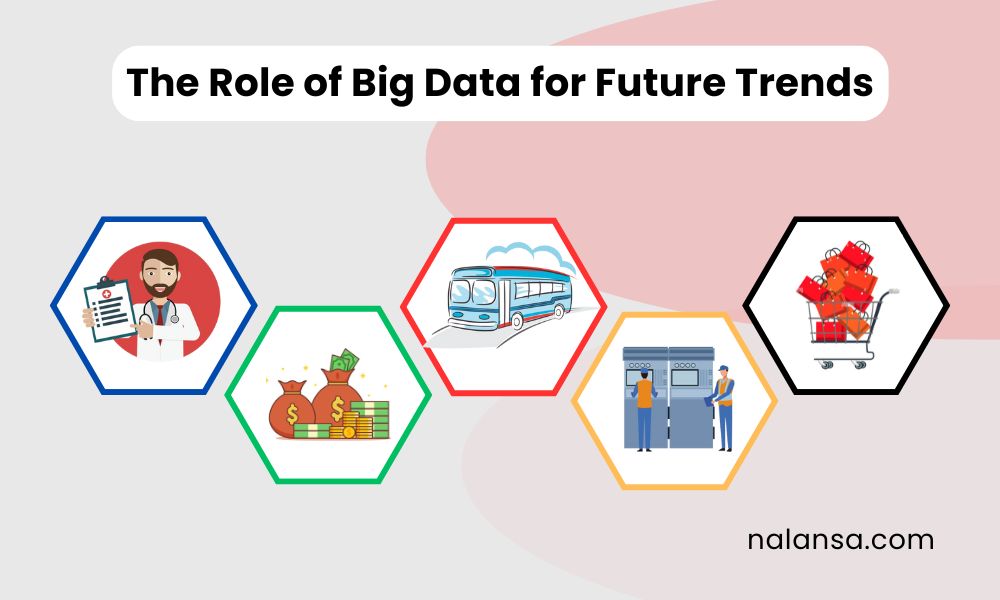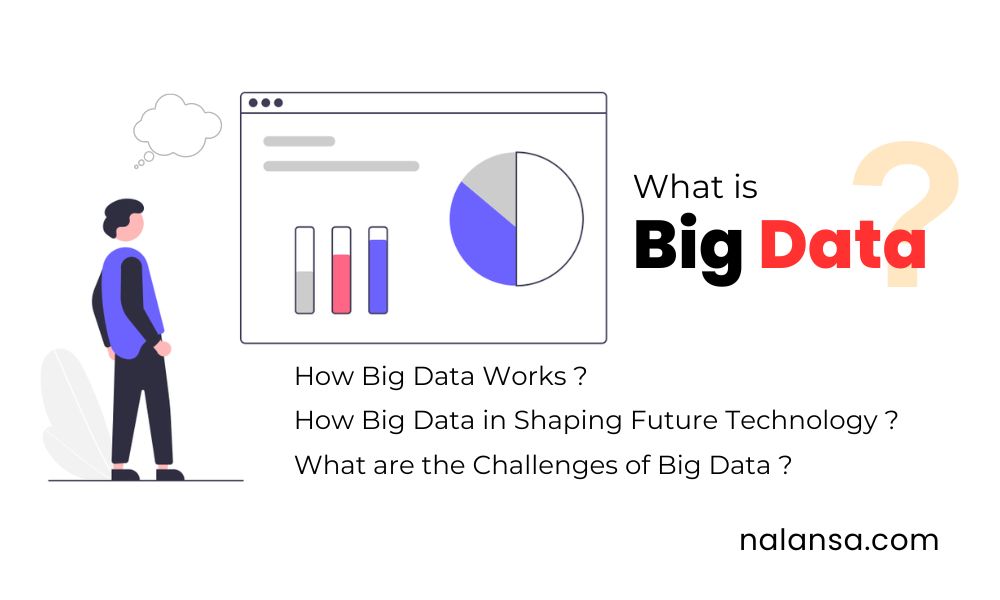In today’s rapidly evolving digital landscape, big data plays a pivotal role in shaping the future of technology. Organizations across various industries are harnessing the power of vast amounts of data to gain valuable insights. These insights drive innovation and improve efficiency. This transition into a data-driven world is not just a trend; it represents a fundamental shift in how businesses operate and make decisions.
Big data encompasses the vast amounts of both structured and unstructured information produced continuously, every moment. With the advent of advanced analytics, companies can now process this data to uncover patterns, trends, and correlations that were previously hidden. This newfound understanding allows businesses to optimize operations, enhance customer experiences, and develop innovative products and services.
As technology progresses, the significance of big data is set to increase even further. From artificial intelligence (AI) and machine learning to the Internet of Things (IoT), these technologies rely heavily on data to function effectively. For instance, AI algorithms thrive on large datasets to learn and improve. Meanwhile, IoT devices generate constant streams of data that can be analyzed for actionable insights.
Table of Contents
- What is Big Data ?
- History of Big Data
- How Big Data Works?
- The Role of Big Data in Shaping Future Technology
- What are the Challenges of Big Data?
- Conclusion
- Frequently Asked Questions (FAQ)
What is Big Data ?
Big data encompasses the massive amounts of both structured and unstructured information produced continuously from diverse sources. This data comes from various sources, including social media, sensors, and online transactions. Its immense size and complexity make conventional data processing tools inadequate. By leveraging advanced analytics and algorithms, organizations can extract valuable insights from it. This helps drive informed decision-making and enhance operational efficiency. Additionally, It’s allows businesses to identify emerging trends. As industries increasingly rely on data, it becomes essential for organizations to harness its potential to stay competitive and innovate in a rapidly evolving digital landscape.
History of Big Data
The history of big data began in the early days of computing. Initially, data storage was limited to mainframe computers. This made data access and analysis difficult. In the 1980s, the introduction of relational databases changed this by improving data organization and retrieval. The real transformation occurred in the 2000s with the rise of the internet and social media. These platforms generated massive amounts of unstructured data. Technologies like Hadoop emerged to help process and analyze this data effectively. Today, Data is crucial in various sectors. It drives decision-making, enhances customer experiences, and powers innovations in artificial intelligence and machine learning. As data continues to grow, the importance of It’s analytics will increase, shaping the future of technology and business.
How Big Data Works?
The Process of Big Data
The journey of big data begins with data collection. Organizations gather information from multiple channels, such as customer interactions, market trends, and operational processes. This data is then stored in powerful databases, such as NoSQL or Hadoop, designed to manage and process large datasets efficiently. Once stored, data can be cleaned and organized to remove inaccuracies and redundancies, ensuring high-quality analysis.
Data Analysis and Insights
After the data is prepared, the next step is analysis. Advanced analytics tools and algorithms, including machine learning and artificial intelligence, are applied to uncover patterns, correlations, and trends within the data. For example, a retail company might analyze customer purchase histories to identify buying patterns and tailor marketing strategies accordingly. This data-driven method empowers businesses to make informed choices, streamline operations, and improve customer experiences.
Real-World Applications of Big Data
Big data is revolutionizing various fields, from healthcare to finance. In healthcare, big data analytics can predict patient outcomes and optimize treatment plans by analyzing medical records, clinical trials, and real-time health data. In finance, it helps detect fraudulent activities by identifying unusual transaction patterns and mitigating risks.
Moreover, in marketing, companies leverage to understand consumer behavior, segment audiences, and personalize campaigns, leading to improved engagement and conversion rates.
The Role of Big Data in Shaping Future Technology
In today’s digital landscape, the volume of data generated every second is staggering, with estimates suggesting that approximately 2.5 quintillion bytes of data are created each day. From social media interactions to online transactions and IoT devices, It’s is reshaping industries and influencing decision-making in ways previously thought impossible. As we explore the role of big data, we’ll look at how it impacts various fields. We’ll highlight its importance in improving efficiency, fostering innovation, and shaping the future of technology.

1. Healthcare : Enhancing Patient Care and Research
The healthcare industry is undergoing a transformative revolution, largely driven by big data analytics. According to a report by Market Research Future, the global data in the healthcare market is expected to reach $68.75 billion by 2025, growing at a CAGR of 22.07%. Through the analysis of large datasets, healthcare professionals are now equipped to make informed decisions that enhance patient outcomes.
- Personalized Medicine : By analyzing genetic information, patient history, and lifestyle data, healthcare providers can develop tailored treatment plans. For instance, studies have shown that personalized cancer treatments can improve patient outcomes by as much as 50% compared to standard therapies.
- Predictive Analytics : Hospitals are utilizing it’s to anticipate patient admissions, allowing them to manage resources effectively. This approach can lead to a reduction in patient wait times by up to 30%, significantly improving care delivery.
- Research Advancements : The ability to analyze vast amounts of clinical data accelerates drug discovery processes. Pharmaceutical companies can identify potential drug candidates faster, reducing the time to market by up to 30%.
2. Finance : Enhancing Risk Management and Fraud Detection
The financial sector has embraced big data as a means to enhance security and improve customer experiences. A report by McKinsey & Company suggests that financial institutions utilizing big data can potentially increase their profitability by 10-15% through improved decision-making.
- Identify Fraud : Advanced algorithms analyze transaction data in real-time, enabling banks to detect fraudulent activities more effectively. This technology can reduce fraudulent transactions by up to 50%, safeguarding both the institution and its customers.
- Risk Assessment : Big data analytics provides financial institutions with a clearer understanding of risk. This data-driven approach allows for more accurate lending decisions, potentially decreasing default rates by as much as 25%.
- Customer Insights : By leveraging customer data, banks can offer personalized financial products, enhancing customer satisfaction. Financial institutions that personalize their services see an increase in customer retention rates of up to 10%.
3. Retail : Transforming Customer Experience
Big data plays a pivotal role in the retail sector, helping businesses understand consumer behavior and optimize operations. According to a report by Deloitte, retailers using data analytics can achieve a 10-20% increase in sales.
- Personalize Marketing : Retailers analyze purchase history and online behavior to create targeted marketing campaigns. Personalized marketing can lead to conversion rates that are 6 times higher than non-personalized efforts.
- Optimize Inventory Management : Data analytics enables retailers to predict demand accurately, reducing excess inventory by up to 30%. This efficiency not only cuts costs but also ensures that popular items are always available for customers.
- Enhance Customer Engagement : Retailers can use data insights to improve customer experiences, resulting in higher conversion rates and increased sales. Engaged customers are more likely to spend 30% more on brands they feel connected to.
4. Manufacturing : Improving Efficiency and Reducing Costs
In the manufacturing industry, big data is pivotal in optimizing production processes. According to Gartner, manufacturers leveraging big data can see a 20-25% improvement in operational efficiency.
- Predict Equipment Failures : IoT sensors collect data on machinery performance, allowing for predictive maintenance. This proactive approach can reduce downtime by as much as 50%, leading to significant cost savings.
- Optimize Supply Chains : Data analytics provides insights into supply chain operations, enabling manufacturers to streamline processes. Companies using analytics for supply chain management report reductions in costs of up to 15%.
- Enhance Quality Control : By analyzing production data, manufacturers can identify quality issues early, ensuring product consistency. This can lead to a 25% decrease in defects and returns.
5. Transportation : Revolutionizing Logistics and Mobility
The transportation sector is leveraging big data to enhance logistics and improve mobility solutions. According to Statista, the global analytics in transportation market is projected to reach $61.42 billion by 2026.
- Optimize Routes : Real-time data allows companies to optimize delivery routes, reducing fuel consumption and improving delivery times by up to 20%.
- Enhance Traffic Management : Cities can monitor traffic patterns using data, leading to a reduction in congestion by as much as 30% and improving urban mobility.
- Enable Autonomous Vehicles : Data from sensors and cameras is crucial for the development of self-driving technology. According to a study by Mckinsey, the integration of data in autonomous vehicles could reduce traffic accidents by 90%.
What are the Challenges of Big Data?
Data Quality and Accuracy
One of the most significant challenges in big data is ensuring the quality and accuracy of the data collected. Inaccurate or incomplete data can lead to erroneous insights, affecting business strategies and outcomes. Organizations must implement robust data validation and cleaning processes to maintain data integrity. This challenge is particularly prominent in fields like healthcare, where patient data must be precise to ensure effective treatment plans.
Data Privacy and Security
With the increasing amount of data being collected, privacy and security concerns have become more pronounced. Organizations must navigate complex regulations regarding data protection, such as GDPR in Europe and HIPAA in the U.S. The challenge lies in safeguarding sensitive information while still leveraging data for analytics. This is particularly vital in industries such as finance and healthcare, where data breaches can lead to significant consequences.
Data Integration
Integrating data from various sources poses a significant hurdle. Organizations often collect data from multiple channels, including social media, transactional databases, and IoT devices. The challenge is to create a cohesive view of this data to extract meaningful insights. In the retail industry, for example, combining online and offline sales data can help businesses better understand customer behavior, but achieving this integration can be complex.
Scalability
As the volume of data continues to grow, organizations face challenges in scaling their infrastructure to accommodate this growth. Traditional data processing systems may struggle to handle large datasets efficiently. Companies need to invest in scalable solutions, such as cloud-based platforms, to manage and analyze effectively. The tech industry, in particular, must constantly adapt to this evolving landscape to stay competitive.
Skilled Workforce
There is a growing demand for skilled professionals who can analyze and interpret big data. However, the shortage of data scientists and analysts can hinder organizations’ ability to derive insights from their data. Businesses across various sectors must focus on training and upskilling their workforce to build a team capable of navigating the complexities of data analytics.
Data Governance
Establishing effective data governance frameworks is essential for managing big data. Organizations need clear policies and procedures to ensure data is handled properly and ethically. This includes defining who has access to data, how it is used, and how compliance with regulations is maintained. Industries like finance, where regulatory compliance is critical, face unique challenges in implementing robust data governance practices.
Real-Time Data Processing
The ability to process data in real-time is becoming increasingly important for organizations looking to respond swiftly to market changes and customer needs. However, achieving real-time data processing can be challenging due to the complexity of data streams and the need for advanced analytics tools. For instance, in the logistics sector, real-time tracking of shipments can enhance operational efficiency, but it requires sophisticated data processing capabilities.
Data Storage Costs
Storing large volumes of data can be costly, especially for small and medium-sized enterprises. Organizations must balance the need for extensive data storage with budget constraints. Exploring cost-effective storage solutions, such as cloud storage, can help mitigate these challenges while still allowing businesses to retain and analyze critical data.
Conclusion
In conclusion, big data is undeniably transforming the landscape of future technology. As organizations continue to collect and analyze vast amounts of data, they are gaining invaluable insights that drive innovation and enhance decision-making processes. Furthermore, the integration of data with emerging technologies like artificial intelligence and machine learning is paving the way for smarter solutions that address complex challenges across various industries.
Moreover, businesses that harness the power of big data are not only improving their operational efficiency but also creating personalized experiences for their customers, ultimately fostering loyalty and engagement. As we look ahead, it is clear that embracing Data will be essential for companies aiming to stay competitive in an increasingly data-driven world. By leveraging these insights, organizations can unlock new opportunities and navigate the future of technology with confidence.
Frequently Asked Questions (FAQ)
What is the role of big data in management information system?
Big data plays a crucial role in management information systems (MIS) by enhancing the quality and efficiency of decision-making processes. It allows organizations to collect, store, and analyze large volumes of data from various sources, providing valuable insights into business operations. By integrating into MIS, companies can identify trends, monitor performance, and make data-driven decisions more effectively. This leads to improved resource allocation, better customer insights, and enhanced operational efficiency. Ultimately, It’s empowers management to make informed choices, driving strategic initiatives and fostering business growth.
What is the role of big data in governance?
Big data plays a crucial role in governance by enabling governments to make informed decisions and improve public services. By analyzing large volumes of data from various sources, such as social media, citizen feedback, and public records, governments can gain valuable insights into community needs and preferences. This data-driven approach helps in identifying trends, optimizing resource allocation, and enhancing transparency.



